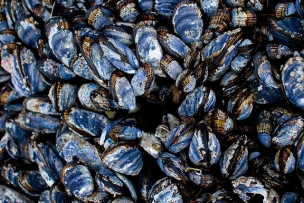By Susanne Rust
Polar bears may have stolen the show when it comes to climate change, but it may be the lowly California mussel that we really should be watching.
 A new study by researchers at UC Davis shows that rising acid levels in the ocean thin and weaken the shells of this diminutive bivalve. And that could spell trouble for entire marine ecosystems.
A new study by researchers at UC Davis shows that rising acid levels in the ocean thin and weaken the shells of this diminutive bivalve. And that could spell trouble for entire marine ecosystems.
“This is a very important species, a foundation species,” said Brian Gaylord, lead author of the paper and a researcher at UC Davis. “They provide habitat, food and refuge for literally hundreds of other animals.”
According to the study’s authors, weakened shells could make the mussels more vulnerable to predation and sickness.
Carbon dioxide, a greenhouse gas, is absorbed in the ocean. Research has shown that between 25 and 40 percent of human-produced carbon emissions have entered the ocean since the beginning of the Industrial Age.
Absorbed carbon then decreases the ocean’s pH, which means its acidity increases. Studies have shown that since 1750, there’s been a 30 percent increase in the ocean’s acidity.
To find out what acidification does to some of the creatures living in the ocean, Gaylord and his team decided to focus on the California mussel, which lives in West Coast seabeds stretching from California to Alaska.
In the laboratory, the team exposed mussels to acid levels that the Intergovernmental Panel on Climate Change – a Geneva-based scientific body established by the United Nations – has projected for the next several decades.
Another group was kept in water with the same acid levels found in oceans today.
The researchers found that the mussels living in the high-acid water had smaller, thinner and weaker shells. They also had smaller bodies.
Gaylord said the weaker shell and reduced body size make the mussels more vulnerable to crabs, which could easily crush their weak shells. Carnivorous snails also could easily drill into the weakened shells.
He said one study already has shown declining numbers of California mussels offshore of Washington state.
Quantifying how much of an impact a declining mussel population would have on marine ecosystems is hard to estimate. But with so many animals depending on them, the effect could be devastating.
The study was published in The Journal of Experimental Biology.
This post also appears at California Watch, a content partner of Climate Watch.
